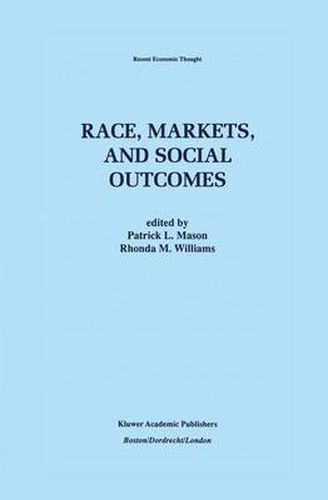Readings Newsletter
Become a Readings Member to make your shopping experience even easier.
Sign in or sign up for free!
You’re not far away from qualifying for FREE standard shipping within Australia
You’ve qualified for FREE standard shipping within Australia
The cart is loading…






This title is printed to order. This book may have been self-published. If so, we cannot guarantee the quality of the content. In the main most books will have gone through the editing process however some may not. We therefore suggest that you be aware of this before ordering this book. If in doubt check either the author or publisher’s details as we are unable to accept any returns unless they are faulty. Please contact us if you have any questions.
THE JANUS-FACE OF RACE: REFLEC- TIONS ON ECONOMIC THEORY Patrick L. Mason and Rhonda Williams Many economists are willing to accept that race is a significant factor in US eco nomic and social affairs. Yet the professional literature displays a peculiar schizo phrenia when faced with the task of actually formulating what race means and how race works in our political economy. On the one hand, race matters when the dis cussion is focused on anti-social behavior, social choices, and undesired market outcomes. Inexplicably, African Americans are more likely to prefer welfare, lower labor force participation, and unemployment. On the other hand, race does not matter when the subject of discussion is economically productive or socially accept able activities and legal market choices (for example, wages and employment). This Janus-faced construction of race is maintained by economists’ stubborn ad herence to the market power hypothesis. The market power hypothesis asserts that racial discrimination and market competition are inversely correlated. Discrimina tory behavior will persist only in those sectors of society where the competitive forces of the market are least operative. When applied to the labor market, the mar ket power hypothesis suggests that pre- and post-labor market decisions represent disjoint sets. On average, members of a disadvantaged social group may accumulate a lower amount of or a lower quality of productive attributes because of discrimina tion in marital, residential, or school choice, or because of substantial animosity in day-to-day interpersonal relations with members of a privileged group.
$9.00 standard shipping within Australia
FREE standard shipping within Australia for orders over $100.00
Express & International shipping calculated at checkout
This title is printed to order. This book may have been self-published. If so, we cannot guarantee the quality of the content. In the main most books will have gone through the editing process however some may not. We therefore suggest that you be aware of this before ordering this book. If in doubt check either the author or publisher’s details as we are unable to accept any returns unless they are faulty. Please contact us if you have any questions.
THE JANUS-FACE OF RACE: REFLEC- TIONS ON ECONOMIC THEORY Patrick L. Mason and Rhonda Williams Many economists are willing to accept that race is a significant factor in US eco nomic and social affairs. Yet the professional literature displays a peculiar schizo phrenia when faced with the task of actually formulating what race means and how race works in our political economy. On the one hand, race matters when the dis cussion is focused on anti-social behavior, social choices, and undesired market outcomes. Inexplicably, African Americans are more likely to prefer welfare, lower labor force participation, and unemployment. On the other hand, race does not matter when the subject of discussion is economically productive or socially accept able activities and legal market choices (for example, wages and employment). This Janus-faced construction of race is maintained by economists’ stubborn ad herence to the market power hypothesis. The market power hypothesis asserts that racial discrimination and market competition are inversely correlated. Discrimina tory behavior will persist only in those sectors of society where the competitive forces of the market are least operative. When applied to the labor market, the mar ket power hypothesis suggests that pre- and post-labor market decisions represent disjoint sets. On average, members of a disadvantaged social group may accumulate a lower amount of or a lower quality of productive attributes because of discrimina tion in marital, residential, or school choice, or because of substantial animosity in day-to-day interpersonal relations with members of a privileged group.